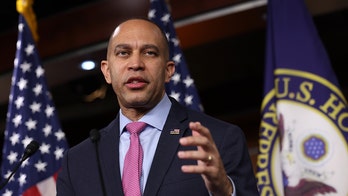Venezuela opposition leader Leopoldo Lopez's father speaks out
Venezuela opposition leader Leopoldo Lopez's father talks to Fox News Latino about his son's time in jail and future.
Since February, Leopoldo Lopez Jr. has sat in a military jail in a remote area of Venezuela, about a 90-minute drive from Caracas, accused of criminal incitement against the government of President Nicolas Maduro.
Lopez Jr., a 42-year-old father of two young children who got his high school and college education in the United States, rallied Venezuelans to take a stand in mid-February against what critics of the socialist-leaning Maduro – and before him, the late President Hugo Chavez – say are policies that have threatened the country’s democracy and crippled its economy.
Tens of thousands heeded Lopez’s call, and since then, have continued taking to the streets, often clashing with pro-Maduro supporters and government security. Dozens of people have died.
For us, our family, both my ancestors and my wife’s ancestors – Leopoldo’s mother – it’s another great ride in a struggle for our country.
One of the few people who can see Lopez in jail is his father, Leopoldo Lopez, Sr.
The elder Lopez harbors the anguish and fears that any father who loves his son would feel, especially when he knows his middle child is in the hands of a government accused by its critics – both in Venezuela and other countries – of trumping up charges against those who oppose it.
“I worry very much about him being there,” Lopez, Sr. said in a telephone interview with Fox News Latino. “He’s in the middle of nowhere, in jail.”
But Leopoldo Lopez Sr. also views the events surrounding his son from the perspective of someone with a family legacy that includes a long line of anti-government agitators who have not been afraid to sit in jail if it meant a better Venezuela.
“For us, our family, both my ancestors and my wife’s ancestors – Leopoldo’s mother – it’s another great ride in a struggle for our country,” he said of his son’s leadership in the opposition movement.
“The commitment to Venezuela is long and comes from both sides of my son's family,” said Lopez Sr., who says he had to give up his restaurant business because of harassment by government officials. “Our roots in Venezuela, and the fight for democracy and honesty in our government, runs much too deep. We love Venezuela. We believe we can change this country.”
With pride, Lopez Sr. says that grandparents and great-grandparents on his and his wife’s side vocally opposed government corruption and rigged elections and mismanagement – and some sat in jail when they did not cower to threats to stop.
There were some relatives, he said, who opted to live in exile when the hounding grew out of control.
But that is out of the question for him, and for his son, he said.
"Maduro said on television that he would throw Leopoldo in jail," his father said. "So were braced for it."
“People ask me ‘Why don’t you all just go live in another country, live in peace, you have the financial means to have a good life somewhere else,’” he said.
Indeed, his son studied in a boarding school in Princeton, New Jersey, where he himself also studied in his teens. The elder Lopez then attended Columbia University in Manhattan. The younger Lopez went to Kenyon College in Ohio, then got his Master’s from Harvard University.
“But Venezuela is our homeland, we will stay and fight for it, push for democracy to return to Venezuela,” Lopez Sr. said.
"Leopoldo was a great mayor," he said. "He dreamed of a strong Venezuelan democracy, a Venezuela that would be globally competitive, that would be productive. He wanted to see the growth of a strong middle class."
It soon became apparent to many who had supported Hugo Chavez and his promises of a more egalitarian, uncorrupt country that "the promises were hollow."
"The promise of a socialism that would benefit Venezuelans was a sham," said Lopez Sr.
A hearing on Lopez Jr.'s case is scheduled for May 8, when a judge will decide whether to try him in connection to damages to the premises of the Attorney General's Office and six police vehicles set on fire on February 12 in anti-government protests.
Lopez's father days his son is holding up well in jail. He’s running strong on just four hours of sleep – a small amount because Lopez Jr. keeps a packed schedule for himself.
On Sundays, they gather at the jail for what they try to jokingly call "our family cell picnic."
"We spread out food, and eat our family Sunday meal, like we always did with Leopoldo at home with the family," he said.
Every day for his son begins at 5 a.m., with a typical Venezuelan breakfast of arepa, and black beans or scrambled eggs.
Then he embarks on the beginning of self-crafted program of staying spiritual and philosophical.
The program is rooted in mental and physical exercise – meditation, which Lopez Jr. starting doing only after being in jail, yoga and strength conditioning.
He reads for intellect as well as for the soul, his father said. He begins his daily reading with passages from the Bible. Then, throughout the day, he reads books by Nelson Mandela, Mahatma Gandhi, and Viktor Frankl, an Austrian neurologist and psychiatrist and Holocaust survivor.
Frankl is particularly known for books, drawing from his own experiences, about staying strong and spiritual in the most trying of circumstances.
“He looks good, he looks strong,” said Lopez’s father. “He’s growing so much, he’s changing. He’s more introspective and philosophical than ever before.”
That, he said, helps him.
“We go into that jail with heavy hearts, so much sadness,” said the elder Lopez. “But when we leave, we feel illuminated by his nature, his disposition.”





